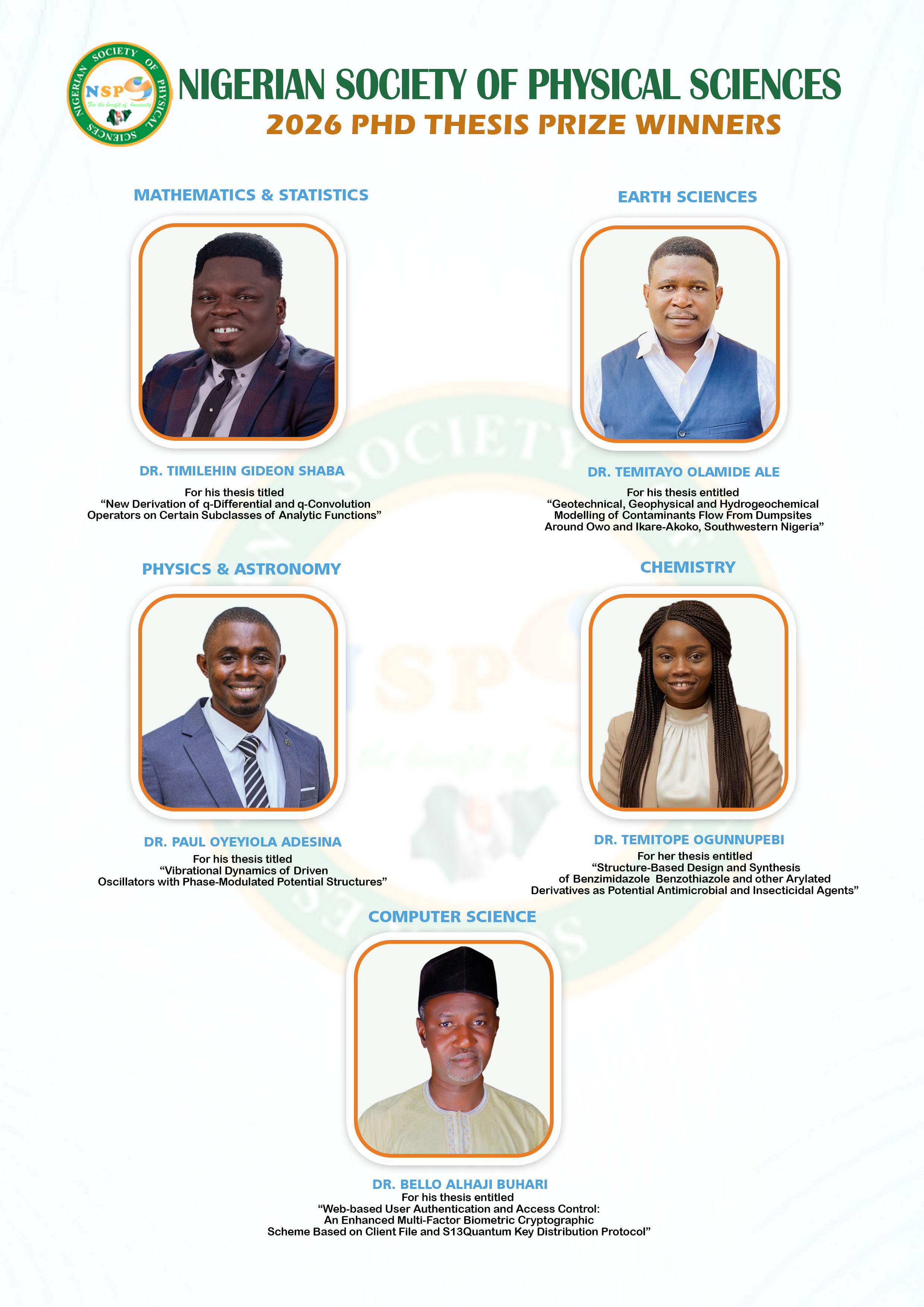Peer Review Process
Editorial Board Assessments
The Editorial Board of Journal of the Nigerian Society of Physical Sciences (JNSPS) consists of members and some non-members of the Nigerian Society of Physical Sciences who are both scientists and experts in their fields of expertise.
Editor-in-Chief and Deputy Editor-in-Chief Assessment
The Editor-in-Chief (EiC) and the Deputy EiC, upon submission, will examine your manuscript to see if it falls within the scope of the journal and then assign it to a Section EiC in one of the JNSPS's disciplines.
Section Editor-in-Chief Assessment
The editor will evaluate whether the manuscript is scientifically sound and then screen it for plagiarism with the help of the editorial assistants (EA). Within 24 hours, the EA will upload the result of the turn-it-in scan to guide the decision of the sEiC. If the turn-it-in similarity index falls below 25%, the sEiC will process the manuscript further by assigning it to an editor. The sEiC also checks the compliance of the manuscript with the author's guidelines.
Section Editor's Assessment
The section editor evaluates the manuscript further for its novelty. If it is OK, the section editor will assign the manuscript to reviewers. The corresponding author will receive a notification about this.
It is worth noting that at any point, the board may decide to reject a manuscript and not require further review. They can also decide to reject manuscripts that aren't in compliance with JNSPS standards. Over 50% of submissions are rejected upon initial evaluation.
Peer Review
All submissions are reviewed at least by two experts. Even though an Editor usually needs two independent reviews, a single negative review is sufficient to decide if the Editor agrees with the report. The identity of reviewers remain anonymous and not disclosed unless the reviewers give permission. All submissions will be subject to a blind peer review (Anonymous Reviewer). The Editor evaluates the reviews' opinions and makes make the final decision. Based on the recommendations,
- the manuscript may be accepted.
- the manuscript may be rejected; or
- the reviewers' reports may be sent to the authors for revision.
- If the article is found to contain too many errors for the reviewers to comment fully on the content of the article, the authors will be required to make major revisions and then resubmit the paper for reviews.
It is worth mentioning that the acceptance rate is currently 19%.
Submission of Revised Manuscripts
When authors have revised their manuscript in response to the reviewers' comments, they are asked to add their replies to the comments as an attachment to their revised manuscript for onward transmission to the reviewers. The revised version may be returned to the original reviewers who are then asked whether the revisions have been carried out satisfactorily. Depending on the reviewers' comments, the article may be accepted or re-review.
Decision on Manuscript
When a manuscript is out of scope for JNSPS, does not fulfill JNSPS's requirements for novelty and relevance, the turn-it-in similarities index exceeds 25%, or has technical flaws that raise doubts about the results' trustworthiness, editors might reject it. Sometimes, an already reviewed manuscript can still be rejected due to a lack of originality or relevance, or to technical issues discovered during the peer-review. More other reasons why an article may not be accepted for publication is when a substantial number of potential reviewers decline the invitation to review, for example, it indicates that the paper's aim and audience do not align with JNSPS's. In this circumstances, the editors will return the paper to the authors so that they might submit it to a more appropriate publication outlet.
Appeal
Within 30 days of the manuscript's rejection, authors can appeal the decision by getting in touch with the editorial office ([email protected]). The appeal must be supported with text modifications and a concise (one-page) explanation of why the manuscript should be reconsidered. Appeal must clarify the importance and the merits of the paper if it was rejected by editors for not meeting the JNSPS's mandate or for not meeting the standards of JNSPS for novelty and importance. The appeal must address technical questions raised by the reviewers. Take note that, in the event that your submission was rejected at the initial stage, you will require additional information or arguments that go above what the editor has read during the review process. This will enable the editor to determine whether your article deserves to be considered again.
Transfers
Manuscripts not accepted for publication in JNSPS are offered an opportunity to be transferred to African Scientific Reports, (ASR), Recent Advances in Natural Sciences (RANS) for consideration. ASR is a peer-reviewed, open-access publication that publishes research in all fields of science, engineering and engineering while RANS focus on physical and biological sciences. You would need to create a user account at the receiving journal if you agree with the transfer. For further information about ASR or RANS, please visit the journal's website. It is worth mentioning that manuscripts must fulfill the acceptance requirements of the ASR or RANS and there is no assurance that a transferred manuscript will be accepted by the journal.






